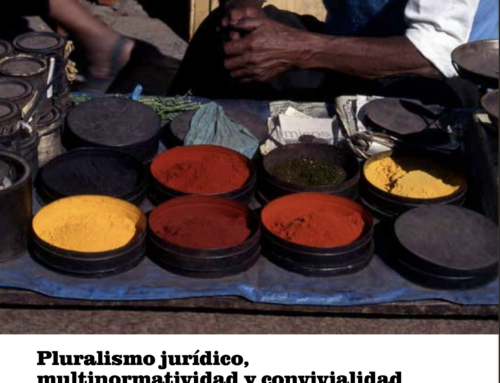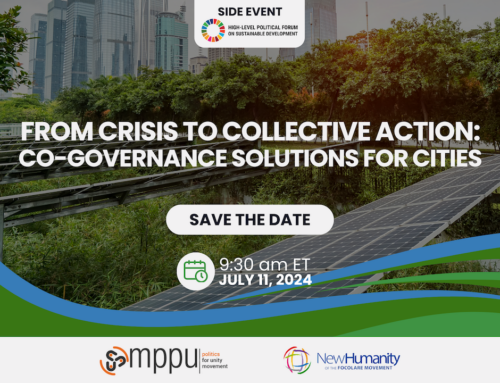Wrote by Javier Andrés Baquero Maldonado
Font: Sophia University Institute

Every morning you open your eyes to face the pain of death, disease and poverty. You are aware that the lives of 7 million people may depend on your actions and decisions. You visualize each person who loses their relatives over two weeks due to COVID-19 without even managing to say goodbye; you are aware of each citizen who does not have the resources to pay for a home during the quarantine and their children go hungry; you are aware of the people who lost their jobs due to the economic crisis, the company that closed. The days pass between hopelessness and faith for every member of the government working on the solutions in a city in crisis.
The world has faced the first truly global crisis and has demanded that governments and leaders take the lead to face it. However, this process is highly complex and has different impacts in each society. In this article, I present an analysis of the experience of the Bogotá government from a particular perspective since I found myself part of the government team in the city.
Colombia is a country with a considerably new democracy compared to Europe. Since 1810 it has been a democratic state, consolidated after more than 300 years of colonization. This young democracy has the peculiarity of being immersed in various internal wars, initially due to differences on matters of the organization of the nation-state, then due to partisan divisions. Since the 1960s, a guerrilla war was fought by far-right militias and the state military force. All this together left more than 8 million internally displaced people and more than 200 thousand dead, to which was then added the violence created by the production and trafficking of drugs since the 80’s.
In this context, Bogotá in particular, has not suffered directly or on a large scale from the violence of the country beyond some terrorist attacks and the fact that this city is receiving the highest amount of population displaced by violence (near 700 thousand people). Bogotá is a city of more than 7 million inhabitants. However, with the metropolitan area the population increases considerably. Before the pandemic crisis 2.5% were under the extreme monetary poverty line (4.3% based in multidimensional poverty) and the 12% below the monetary poverty and a Gini coefficient of 0.504.
This reality was exacerbated by COVID 19 as many companies had to close thereby generating an increase in unemployment from 10.5% in December 2019 to 21.4% in July 2020. The situation is even more complicated due to the higher percentage of informal jobs which are particularly vulnerable to the crisis.
- Care at the Center of the Government’s Agenda and Its Dilemmas
The priorities of a government and a city are reflected in the government agenda specified in many political instruments such as the development of a government plan and budget. Given the scarce economic, organizational, political and media resources available, priority must be given to the issues that truly matter.
It does not seem to be a permanent dilemma on the governments’ agenda: “life or economy”. But it is often evident that the achievement of macroeconomic stability, growth and productivity have largely determined the agenda of governments, along with taking care of human life and the planet in general. This is how human beings die from hunger in the world or society although there are food and resources to solve this problem, without mentioning wars and the impact on lives of all illegal economic activity.
This has not been an exception in our context given that social distancing is the only effective way to prevent the impact of COVID-19 on health, which brings into evidence the dilemma of whether to stop the economy to go to quarantine. In Colombia, this trade-off between economic stability and public health has been a subject of an ongoing debate between the national government and the city government.
Faced with economic problems and giving priority to economic reactivation, the national government has promoted measures such as decreeing some days off from the consumer tax, encouraging massive purchases in public establishments, which generated large crowds in the most important stores. In the same way, the national government issued decrees to reactivate certain sectors of the economy for the entire country which has impacted large cities since the use of public transportation and shopping have considerably increased the rate of contagion, and therefore deaths. Finally, the economic measures that have been taken to a large extent have focused on the stability of the financial sector and the most relevant and formal economic sectors.
The city government has been cautious in its measures to reactivate the economy, prioritizing the care of citizens, quarantine measures, distancing and supporting the health system to prevent its collapse. Although the district government initially had transportation, education, reduction of poverty and gender as its priorities; the COVID emergency changed the agenda to care. Likewise, decisions had been made affecting the economy at first due to the lack of the health system’s capacity. Several total and partial quarantine measures were declared. For instance, the national government was asked to close the airport and the roads to avoid the increase of contagion rates.
This has involved great challenges to guarantee the basic needs of the most vulnerable population. Efforts have been made to identify this poorest population and the Bogotá Solidaria en Casa strategy was implemented to promote the care of vulnerable households through cash transfers providing a basic income for more than 550 thousand households; other measures implemented were the distribution of about 1 million food baskets, the allocation of 30 thousand grants for rent payment, discounts in public services, universal health care regardless of the particular health insurance system; and finally subsidies for the cremation of COVID-19 corpses.
The quarantine has drastically increased domestic violence against women. Therefore, women’s housing and rental subsidies were set up. Poor people have been infected and have died at a higher rate given their need to generate income leading them to expose themselves. Besides they live in more overcrowded homes, with limited resources for care. So new alternatives for distancing had to be considered.
Despite the efforts of the government of Bogotá, these measures would not have been enough to help the number of vulnerable households in the city in a sustainable way. These measures recognize the difficulties that the quarantines have generated, but they also make more evident the high vulnerability in which the current economic system places a large part of the population as a result of the high poverty and inequality prevailing in the country.
- Co-governance to Overcome the Crisis
Given the context described above, it is very complex to govern a city the size of Bogotá, affected by a pandemic. This is even more so given the uncertainty of a crisis where every decision is an act of acupuncture so delicate that each decision can activate or deactivate a nerve to the point of determining reactions in the system.
The liberal reforms in Latin-American gave a reduced role to governments in managing public affairs, leading to the dismantling of the state apparatus with the idea that they are very costly, inefficient and large. So many of the services provided by the state before 1980 have been privatized. This is the case with health, education and housing, promoting a governance system that delegates many public issues to the market, thinking it would be more efficient and effective.
The emergency situation produced by the coronavirus has shown the important role that politics, the state and governments have to play in the direct coordination and management of public problems. Politics plays a central role in guaranteeing the common good, which is why not everything can be delegated to the market, to the logic of supply, demand, economic efficiency, profitability and the capacity to pay.
Despite the fact that a good part of the health services are provided by private companies in Colombia, in the face of the emergency the State regained control of the entire health system to guarantee universal care for all citizens. Additionally, the State restricted free movement, as well as free production and commercialization, generating controls and conditions so that companies could start activities with a level of control over compliance with biosecurity protocols.
However, since the government has failed to respond fully effectively to all the problems, the population suffers the consequences of the pandemic and the costs of bureaucratic inefficiency. Even though the government is monitoring the effects in real time, aid arrives with some delay which could be frustrating for decision-makers.
To be part of the government team implies being aware of people’s pain and our inability as rulers to completely solve these problems. In particular, I had the opportunity to meet the citizens most affected by the quarantine, who take to the streets to protest because they find it difficult to obtain food or pay rent. I am aware of the Government’s inability to respond to so many needs effectively and promptly. And although we have not caused the pandemic, we do become those responsible for the inefficiency in achieving results despite the best political will to face the emergency. There has been a learning curve to operate new services and functions due to the pandemic; the government especially did not have the operational capacity to respond; it has had to acquire this capacity in the process.
However, this emergency government model is politically, economically and socially unsustainable, which is why the proposal for collaborative governance or co-governance has taken on greater force. We are all co-responsible for our present and future with a central role for civic culture, in which I am responsible not only for whether I am infected, but also for infecting others. Therefore we must self-restrict encounters, keep distances, always use elements for protection appropriately, in such a way that care depends on the way each and every citizen behaves.
Besides, we find co-responsibility among the various governments: Bogotá, the metropolitan area and the central government. It is important to state that the political parties in these areas could be in disagreement. There has been effective coordination between the government of Bogotá and the governments of neighboring cities, which has made it possible to restrict and control mobility, universalize the right to health and promote economic exchange.
Coordination and harmonization of decisions is critical in this time of crisis. In practice this work has not been easy overall between the local government of the city and the national government. Conflicting decisions have been made between the two governments and dialogue failed to avoid major mistakes in handling the crisis. This has shown the high cost of resolving political conflicts with partial criteria and not with a comprehensive, complete vision of the common good.
Finally, there has been a virtuous collaboration with the private sector and the academy. Despite the high economic costs, the city’s entrepreneurs have been aware of the situation in which the city finds itself. Firms have accepted most quarantines, acknowledging that economic recovery requires them to make efforts to implement biosecurity protocols. Additionally, several businesses have assumed the costs of keeping their workers’ jobs even with operations stopped, but what has surprised the city the most is the solidarity they have shown in the substantial donations they have made to generate hospital emergency care and social assistance.
Meanwhile, citizens have maintained a responsible tax culture, making their tax payments and helping to maintain the city’s budget. In this sense, liberal governance has not made it possible to overcome the crisis, but it is clear that a governance model dependent solely on the ability of the state to solve all the problems is inadequate to deal with the complexity of the COVID crisis. Thus, collaborative governance is the model that allows effective results, sustainability and responsibility, so that each one is part of the solution. Nevertheless, it is important that government generates trust, legitimacy, dialogue, openness and respect for each of the actors, not putting the government network at risk as a consequence.
- People and Relationships Are the Key
Structural and institutional factors have been given great weight historically in the strategies or methods to build and promote social change. Therefore, all faith has been put in institutional systems and arrangements since this is a particular vision of economists, politicians, lawyers and bureaucrats.
However, the management of this pandemic has shown that it is people and their relationships that determine the outcome of governments, since it depends on the ethics and responsibility of decision-makers and the behavior of the leaders and of the various actors. As the tasks not only depend on the leaders but on all people who are part of the government, it is an unusual challenge, particularly in Bogota, to ensure that all public servants feel the pain of every person and seek the best solutions. Every public servant needs to develop the ability to be empathetic, to be able to see through a citizen’s eyes with the love that he sees his children, to act towards their well-being, without fostering dependency, but maturity and freedom, and always with dignity.
Change cannot be brought about if those governing cannot experience the feeling of complete abandonment in all its dimensions and expressions; this is the pain of those who suffer because of injustice, of those who lost a certain quality of life or have never had it. If it is not possible to live the experience of abandonment and thus experience the inability of a government that finds it difficult to respond to the challenges of each moment, there is not enough motivation to govern for the common good and cooperate socially.
It is so that people who are behind a desk deciding matters, who must have the integrity and ability to feel this in order to verify a government’s representativeness. For example, silencing a social protest that demands a better quality of life using police force is an act of ignorance of otherness and the pain of those who are on the street demanding their rights. Social dialogue must overcome the vision of enmity between the state and social movements, because a government has the responsibility not only to decide and act, but to listen, dialogue and agree, even in times of crisis.
In Bogotá we have not been able to resolve all the pain, but by embracing the pain of citizens with empathy, by apologizing for the lack of effective responses, it has allowed us to experience something more than that pain. Little by little, some communities which protested earlier have also identified the limitations of the government as a result of the dialogue; they have understood the efforts and have contributed to solving the problems.
Finally, it is equally important to recognize that the rulers are also under high political, media, social and judicial pressure, which leads to high levels of stress, frustration and exhaustion. This also requires a degree of reciprocity on the part of the citizenry. It is evident that interpersonal relationships among members of the government give strength. They are fundamentally important in times of crisis.
We must identify new political categories. In Bogotá, despite the increase in COVID-19 infections and deaths, taking care of people means to partly disinfect society of selfishness and recognize that rulers aren’t solely responsible, that we are all responsible for everyone. We all become politicians when we leave ourselves to embrace the pain in the other (person or people). Thus, a government that feels and takes charge of the suffering of its people is capable of making love a daily political practice; taking care of the city, the country, humanity, the planet; losing everything to go out to meet others even in the midst of the experience of hopelessness.
Javier Andrés Baquero Maldonado
Javier Baquero ha frequentato a Sophia il corso di Laurea in Scienze politiche dove ha approfondito in particolare il tema del governo e della partecipazione. Dal gennaio 2020 è consigliere per le politiche pubbliche presso il Dipartimento per gli alloggi dell’Ufficio del sindaco di Bogotá. Direttore dell’Osservatorio colombiano delle Politiche Pubbliche, fa parte del team di coordinamento del Movimento politico per l’unità e del Comitato scientifico del Progetto internazionale #daretocare.
Cfr. Walter Baier, Franz Kronreif (Eds.)
“Europe as a Common – Exploring Transversal Social Ethics”. Volume I.
ISBN: 978-3-643-91298-5






Leave A Comment